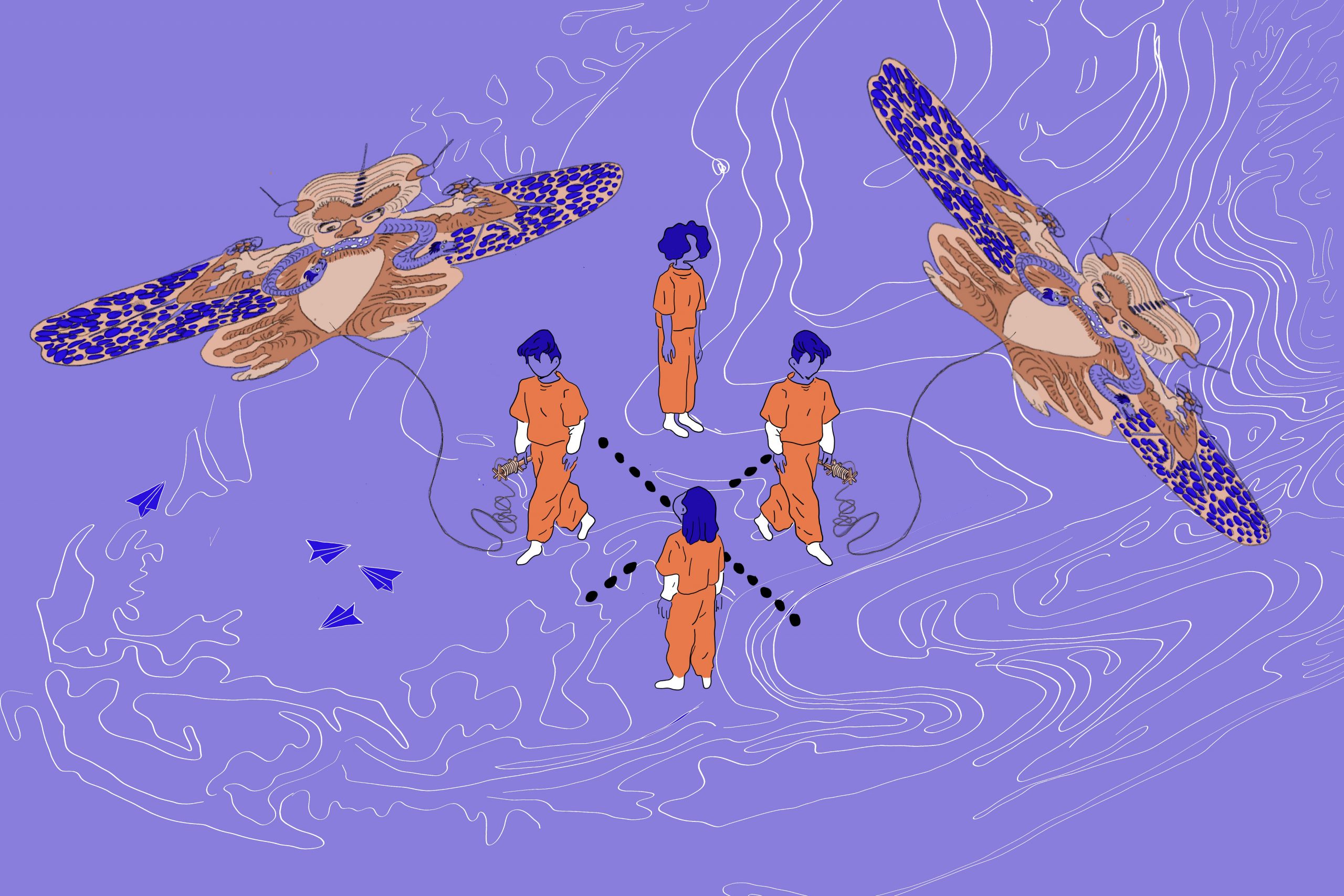
Prison Pen Pals
by Izzy Dernedde | February 28, 2022
Entering the WriteAPrisoner.com website, the user is greeted by a seemingly endless list of prisoners. Advertising to potential penpals with a photo and a short biography, these inmates are looking to bridge the gap to the outside world and stave off feelings of isolation. Unable to reach out themselves, they hope that someone will come across their profile and choose to make contact instead.
A blue box at the top of the page offers the opportunity to filter profiles down according to the user’s preference. Ethnicity, religion, sexual orientation, sentence length, marital status and sex are among categories listed. WriteAPrisoner.com is one of many websites established with the aim of facilitating prison-penpal relationships between inmates and those who wish to write to them. The site expounds the potential benefits to such connections, claiming that providing companionship can help rehabilitate prisoners, boost morale and prevent internal disorder. Intrigued to know how successful this could be, I spoke with Carmen, a Dutch woman, who has developed correspondences with two inmates since January 2020. She decided to write to inmates knowing she could offer them life changing companionship, and the outcome has been two long standing relationships. Conducted by letter, these have been incredibly beneficial to the lives of all involved. Despite the prospect of positive outcomes, certain features of the site raise questions about potential problems, both for inmate and outside users of the website.
It seems as though the filtration tool of WriteAPrisoner.com website also caters to individuals who are looking for a different way to find love, owing to the fact that loneliness is not confined to the bounds of prison. Given the nature of the site, it is hardly surprising that romantic connections have been formed and are being actively sought out through it. Carmen commented on the depth of the connections these correspondences almost inevitably bring. Given the nature of how these emotional and spiritual bonds are forged, on the basis of vulnerable and relatively deep discussions in long letters, rather than small talk or texts, this isn’t all that surprising. This gives the relationship (whether platonic or romantic) a unique intensity, and Carmen commented that “I can understand why someone would fall in love, it’s not about them seeing your best angle, not about all the things you normally do to flirt and impress, this is very honest, they don’t have a lot of people around to speak like that with. I’ve never been so personal with someone in such a short period of time.” Clearly, users pick up on how common this can be, as a cursory scroll down the first page of forum topics on the site reveals users grappling with discussion topics labelled: “so is this a pen pal site or dating site?”, “I love my pen pal and it’s doing my head in”, and “falling in LOVE with penpal..anyone else?”
In seeking an answer to why this route to love seems to be getting increasingly popular, it should be considered that the aspect of control in the relationship is no doubt very appealing. Forming a relationship with someone who is incarcerated gives the individual writing to them the power in this dynamic. This may be particularly important for those who have been in abusive relationships, as established by Sheila Isenberg, author of Women Who Love Men Who Kill. It is mostly women who write to men in these scenarios, something that has implications for this dynamic, with a desire for this reversal of the typical gendered roles likely being sought. Prisoners are also often highly available with lots of time and few options for meeting others. Isabelle, one of the women I spoke to about contact with prisoners, referred to the physical appearances of many of those contacting prisoners, commenting: “I’m physically an attractive person – it sounds weird to say that but most of woman who write to prisoners are alone, they feelunattractive.”
While it is understandable that relationships may emerge from correspondences, and that those who have been unlucky in love might seek a connection in a dating pool where they are in higher demand, some features of the WriteAPrisoner website do lead to concern. One WriteAPrisoner user ST4s compared searching for a partner on the site to using Amazon: “You could still go to the store and find something, but on Amazon you can instantly get exactly what you want.” This commodification of inmates provides dual cause for worry. It dehumanises a group of people by tying their value to appearance. On the other side, it disregards victims and the crimes committed against them through valuing the prisoner by their looks rather than their actions, but on the other, thereare some insidious implications in the sexualisation of inmates.
Looking at reactions to the site on apps such as TikTok can be discouraging in this regard. Many TikToks are created with the song lyrics “Mama I’m in love with a criminal, and this kind of love isn’t rational, it’s physical,” with the image of an attractive inmate shown on screen. However, it is evident that there is a line many people draw on who is deemed to be ‘too bad’ to write to. This is suggested by comments such as those made by TikTok user phillyfan104, who writes “you have to make sure she ain’t a killer though”. Moving on from this concern , we can also ask the following question: does physical attraction mean it’s a good idea to reach out to someone in prison from the perspective of the outside user’s safety?
The perspective of Big White, who runs the YouTube channel Stories from the Penitentiary was illuminates the effects of writing to someone who has committed a serious crime. Big White writes to prisoners who have committed very serious crimes, not to provide them with companionship but to uncover their stories and understand their mindset. When asked if he thought writing to prisoners affected him, he said it depends where the conversation goes. For Big White, the energy of the letters even when they are sat unopened near him is palpable, and the task of writing to these individuals can be very draining. This casts a new light on the prison-penpal relationship and draws attention to the importance of its nature. Big White’s relationships with penpals reveal that the line determining who it is okay to be in contact with can shift from person to person. Casual correspondences or, occasionally, friendships like the ones Big White has cultivated, are very different to romantic and deeply emotional connections.
Jason Moss’ story adds another layer of nuance to this picture. Big White told me that Jason Moss was writing to infamous serial killers such as John Wayne Gacy, the ‘Night Stalker’ Richard Ramirez and brutal murderer Jeffrey Dahmer.. Moss was playing a particular angle, trying to pretend to be an admirer or the perfect victim of each one he spoke to. In particular, he forged a strong relationship with Gacy and even felt he was being manipulated to such an extreme that he was could have been said to become Gacy’s ‘last victim’. Big White suggested that he may have gotten lost in that mindset. Considerations of whether or not it is right to be writing to prisoners should therefore take into account whether it is a good idea for the health and life of the person writing. Watching Big White’s YouTube channel, in which he reads out the letters from his correspondences, is a reminder that these relationships should not be treated lightly. There is reason to have some caution in writing to prisoners, especially those who cross that shifting line into ‘too evil’ territory for many. Of course, people are imprisoned for different reasons. While we might expect writing to someone who has committed a premeditated murder to have this possible disturbing effect on the psyche of their penpal, writing to someone who was imprisoned for possession of drugs might be a very different experience.
I asked Carmen how she chose which inmate to write to, which led her to reveal that she did not do so without stipulations. She had limits and wouldn’t write to anyone who had committed a sex related crime. I found that this was the most common line drawn among people who choose to write to inmates, with some particularly emphasising avoiding those who have committed crimes against children. For Carmen, it was also important that the crime wasn’t planned, particularly in the case of murder, as she simply couldn’t relate to the perpetrators of these crimes.
Big White, on the other hand intentionally writes to those he can’t relate to, out of an interest in uncovering their motivations. On his channel, he specifies that he writes to those guilty of “serial murder, espionage, terrorism, and everything in-between.” Interestingly, though his intentions are mostly investigative, Big White has his own rules about who he won’t strike up correspondences with. Even within this capacity of writing out of interest rather than out of the intention to support, Big White specified that he wouldn’t write to sex predators. He already knows exactly why they did what they did and in his eyes it affects so many women that he doesn’t wish to justify such criminals with a conversation. Those he does write to, however, do not always remain as merely a subject of investigation. His ideas on who is ‘bad’ and undeserving do not seem to be entirely fixed, as he has fostered friendships with some of those he has written to. He also points out that these inmates are just humans.
There are many others who see individuals being separate from their crimes. I spoke to 38-year-old Isabelle, who began writing to an inmate named Jason 15 years ago. Isabelle fell in love with Jason, an inmate serving 25 years for murder, after seeing him on a documentary about forgiveness. Now married, the pair have embarked on a permanently long-distance relationship: not only does Isabelle live in France, and Jason in the US, but they must also communicate through prison walls. For Isabelle, the man she saw on her screen was like anyone else. In reference to the fact that they fell in love while he was in prison, she said “[there was] no reason in particular, if it was a documentary about cosmonaut, I would be in love with a cosmonaut, unfortunately he is a lifer, we deal with it.” She told me she understands that accidents happen and that he was young, and that she sees him as a different person, loving him for who he is now and not for his past. Similarly, Lorna, who writes to a penpal named Bobby Hampton, commented that she hadn’t looked him up or read his case file. In answer to the question “What did he do?” she replied: “It’s the whole opposite of the point.” She continued: “The reason we write to Bobby is because he’s much more than whatever he’s in prison for.” Lorna stressed the fact that reform is possible. In these cases, it seems to come down to individual assessment of whether the inmate has reflected and changed since their crime, or whether different circumstances around their crime mean that they shouldn’t be judged from it. Isabelle and Lorna’s relationships with their penpals suggest that distance from crime in terms of time is also an important factor in assessing whether or not it is okay to write to a certain inmate. With enough time having passed, it even can be as though you are writing to a new person.
There is, of course, no definitive answer on who one should write to. Great relationships can emerge from prison-penpal correspondences, both platonic and romantic. Those in prison are human beings, and this is why those outside the prison walls should be wary of their commodification by the WriteAPrisoner website and some of its users. Not only should they be respected as people, but those choosing to write should also not take this correspondence lightly. While many on the site are individuals who have made mistakes, it can be an emotional weight to write to those who have a different moral ideology than oneself, particularly if they discuss darker topics. Sites such as WriteAPrisoner can create distance from the reality of a user’s correspondent, and within these small, irregular interactions the true nature of the person on the other side is not always fully revealed. This is only one side of the coin, but it can be argued that this can be true for any relationship, regardless of whether one is imprisoned or not. Instead of dissuading people from writing, since the conversations I have had with those who have written have proved the positives that can come out of these interactions, I merely seek to point out that the element of physical distance provided by the site should not enable us to forget that inmates are individuals in their own right.
For an incredible insight into the experience of writing to inmates, visit Big White’s YouTube channel Stories from The Penitentiary, which documents his correspondences with a number of inmates: https://www.youtube.com/c/StoriesfromThePenitentiary/featured ∎
Words by Izzy Dernedde. Art by Peng Yao.




